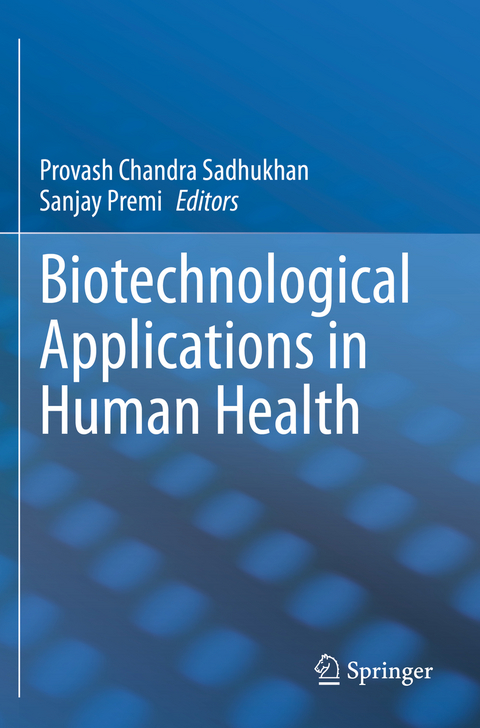
Biotechnological Applications in Human Health
Springer Verlag, Singapore
978-981-15-3455-3 (ISBN)
The book appeals to students, academics and researchers in a wide range of subject areas, including biotechnology, life sciences, medicine and cancer research.
Dr. Provash Chandra Sadhukhan, Ph.D, Scientist –E, ICMR-National Institute of Cholera and Enteric Diseases, Kolkata did his M.Sc and Ph.D from Dept. of Biochemistry, University of Calcutta and did his postdoctoral work in the Dept. of Cancer Biology, Cleveland Clinic Foundation, USA for more than six years. In his postdoctoral study, his major area of research was on interferon and NF-κB signaling in bladder and kidney cancer. He also did gene therapy work for bladder cancer treatment. He joined ICMR Virus Unit, Kolkata in the year 2005 and working in different aspects of Hepatitis C and dengue virus. His present research interests are low cost viral detection, molecular epidemiology, host virus interaction, viral pathogenesis, Nanomedicine for viral replication inhibition and cell signaling. Currently, his research team is working in the field of infectious diseases with special emphasis on RNA viruses, Dengue and Hepatitis C Virus. The major thrust in the group focuses on the propensity of envelope gene antigenic dynamicity and its implication regarding neutralizing antibodies and its associated host cell receptor mediated entry of HCV and dengue virus. HCV infections within high risk group population and their immune response against this virus. The functional role of HCV RNA and its structural protein (core protein) associated with signaling pathway leading to patho-physiological changes in liver hepatocytes is also being explored. His research platform is based on HCV and dengue from eastern and north eastern region of India and an exhaustive interface between clinical sciences, experimental biology, bio-informatics which leads to translation research. He has more than 45 publications in national and international journals. Dr. Sanjay Premi, is an assistant professor at Moffitt Cancer Center with an affiliated assistant professor ship at University of South Florida, Tampa, Florida, USA. He completed his master’s and PhDdegrees from Jawaharlal Nehru University, New Delhi, India in 2008 and moved to USA for his postdoctoral training. After spending about 7 years at Yale University as a postdoc and associate research scientist, he was hired as a faculty by Moffitt Cancer Center. Dr. Premi is a renowned scientist in the fields of photobiology, skin carcinogenesis, and skin pigmentation. During his PhD, he established a unique signature of radiation exposure in human genome which seems to buffer out the carcinogenic and genotoxic effects of high background radiation. During his postdoc at Yale, he discovered a carcinogenic role of the skin pigment melanin which is otherwise considered as a potent sun-shield. Till date, Dr. Premi has published around 20 peer reviewed articles in high impact journals which includes Science, PNAS, and JID. In 2018, he was awarded the prestigious Wellcome-DBT India Alliance fellowship worth ~500k US dollars. He is frequently invited guest speaker at various national and international institutions and meetings.
Foreword.- Chapter 1: Design of Multi-wavelength Near Infra-Red probe to detect risk areas in diabetic foot.- Chapter 2: Cellular and molecular response for sensitising cancer cells and protecting the normal cells from radiation-induced damages.- Chapter 3: A Novel Approach for Production and Study of Medical Ultrasound from Low Cost Electromagnetic Transducers.- Chapter 4: Altered profile of regulatory T cells and NKT cells are characteristics of Chikungunya associated polyarthralgia.- Chapter 5: Cytotoxicity and Apoptosis of Human Colon Carcinoma Cell (HT 29 Cells), Treated with Methanolic Extract of Chlorococcum humicola.- Chapter 6: Universal primer design for the detection of diverged CTX-M Beta Lactamases (ESBL) that give penicillin and cephalosporin resistance during superbug infections.- Chapter 7: Lipopeptides as therapeutics: Molecular docking and drug design.- Chapter 8: Design and Simulation of Geometrical Shape and Size Variations ofMicro-electrode for Cochlear Implant.- Chapter 9: Molecular and Protein Interaction Studies for Inhibiting Growth of Human Leukemic Cells: An In silico Structural Approach to Instigate Drug Discovery.- Chapter 10.- Laccase Mediated Synthesis of Bio-material using Agro-residues.- Chapter 11: Extraction of Fungal Xylanase using ATPS-PEG/sulphate and its Application in Hydrolysis of Agricultural Residues.- Chapter 12: Thyme (Thymus vulgaris) essential oil based antimicrobial nanoemulsion formulation for fruit juice preservation.
| Erscheinungsdatum | 14.05.2021 |
|---|---|
| Zusatzinfo | 35 Illustrations, color; 17 Illustrations, black and white; X, 114 p. 52 illus., 35 illus. in color. |
| Verlagsort | Singapore |
| Sprache | englisch |
| Maße | 155 x 235 mm |
| Themenwelt | Medizin / Pharmazie ► Medizinische Fachgebiete ► Biomedizin |
| Medizin / Pharmazie ► Physiotherapie / Ergotherapie ► Orthopädie | |
| Studium ► 2. Studienabschnitt (Klinik) ► Humangenetik | |
| Naturwissenschaften ► Biologie ► Genetik / Molekularbiologie | |
| Technik ► Medizintechnik | |
| Technik ► Umwelttechnik / Biotechnologie | |
| ISBN-10 | 981-15-3455-1 / 9811534551 |
| ISBN-13 | 978-981-15-3455-3 / 9789811534553 |
| Zustand | Neuware |
| Informationen gemäß Produktsicherheitsverordnung (GPSR) | |
| Haben Sie eine Frage zum Produkt? |
aus dem Bereich


